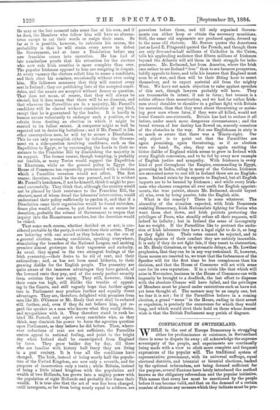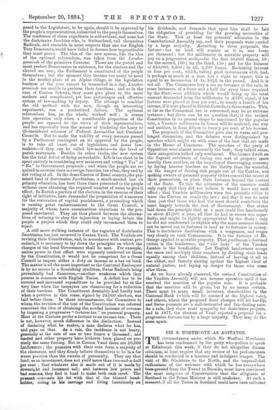CONFISCATION IN -SWITZERLAND.
ANT HILE in the rest of Europe Democracy is struggling either for predominance or existence, in Switzerland there is none to dispute its sway ; all acknowledge the supreme sovereignty of the people, and experiments are continually being made with a view to elicit more complete and frequent expressions of the popular will. The traditional system of representative government, with its universal suffrage, equal electoral districts, and triennial or biennial elections, backed by the optional referendum, not being deemed sufficient for the purpose, several Cantons have lately introduced the method known as the obligatory referendum and the popular initiative. This means that every law must be sanctioned by the people before it can become valid, and that on the demand of a certain number of citizens any measure which they indicate must be pro- posed to the Legislature, to be again, should it be approved by the people's representatives, submitted to the people themselves. The crudeness of these expedients is self-evident, and none but the doctrinaire Jacobins who, in Switzerland, call themselves Radicals, and resemble in more respects than one our English Tory Democrats, could have failed to foresee how impracticable they must prove. The idea of the new system, like the idea of the optional referendum, was taken from the Landes- gemeinde of the primitive Cantons. These are the purest and most perfect Democracies in existence, for the electors and the elected are one ; the Parliament is constituted of the people themselves ; but the moment they become too many to meet in the market-place of an Alpine village, or the legislative business of the year cannot be transacted in a day, Landes- gerneinde are unable to perform their functions ; and as in the case of Canton Schwyz they must give place to the more modern and complicated, yet less picturesque and effective system of law-making by deputy. The attempt to combine the old method with the new, though an interesting experiment, was a predestined failure. The optional referendum has, on the whole, worked well ; it comes into operation only when a considerable proportion of the people are opposed to the views of their representatives, and has repeatedly been the means of hindering the hasty or ill-considered schemes of Federal Assemblies and Cantonal Councils. But to make the validity of every measure passed by a Parliament contingent on its approval by the people, is to take all heart out of legislation, and lower law- makers—if they can be called law-makers—to the level of parish vestrymen. Besides its other faults, the new system has the fatal defect of being unworkable. Life is too short to be spent entirely in considering new measures and voting" Yes" or "No" to Government proposals ; and when the people are re- quired to exercise their sovereign function too often, they end by not voting at all. In the dead-Canton of Basel country,the pro- mised land of doctrinaire Jacobinism, a much-needed law on
primary education has been three times presented to the people without once obtaining the required number of votes to give it effect. In Zurich a portion of the electors, in the exercise of their right of initiative, have demanded the preparation of a measure for the restoration of capital punishment, a proceeding which is causing great embarrassment to the Great Council, a majority of whom have conscientious objections to the pro- posed enactment. They are thus placed between the alterna- tives of refusing to obey the injunction or laying before the people a project which they could only recommend them to reject.
A still more striking instance of the vagaries of doctrinaire Jacobinism has just occurred in Canton Vaud. The Vaudois are revising their Constitution, and, in accordance with ancient pre- cedent, it is necessary to lay down the principles on which the charges of the local Government shall be met. For example, unless power to that effect were expressly conferred on them by the Constitution, it would not be competent for a Great Council to impose either a duty on income or a tax on land. The matter is all the more important as the Cantonal Exchequer is by no means in a flourishing condition, Swiss Radicals being proverbially bad Enanciers,—another weakness which they possess in common with English Tories. A deficit has to be covered and increased expenditure to be provided for at the very time when the taxpayers are clamouring for a reduction of their burdens. The Constituent Assembly had hardly met when a petition in this sense, signed by 24,000 electors, was laid before them. In these oircumetanoes, the Committee to whom the revision of the text of the Constitution was referred conceived the idea of obtaining the needed increase of revenue by imposing a progressive " fortune-tax " on personal property. Most of the Cantons prefer a fortune to an income-tax. There is not, however, much difference in the distinction. Instead of declaring what he makes a man declares what he has, and pays on that. All a rule, the incidence is not heavy, generally at the rate of one or two francs a thousand ; and landed and other property have hitherto been placed on pre- cisely the same footing. But in Canton Vaud there are 20,000 landowners ; the peasants with their eons form a majority of the electorate, and they firmly believe themselves to be in a far worse position than the owners of personalty. They say that land, as an investment, does not yield more than two-and-a-half per cent. ; that whatever else is made out of it is made by downright aud incessant toil; and between low prices and bad seasons, they find it hard to make both ends meet. The peasant contiaste his lot with that of the bloated bond- holder, tiding in his carriage and living luxuriously on his dividends, and demands that upon him shall be laid the obligation of providing for the growing necessities of the State. This at least the peasants' advocates in the Constitutional Assembly say, and their proposals were carried by a large majority. According to these proposals, the fortune - tax on land will remain as it is, one franc per thousand ; but the millionaire in movable property will pay on a progressive scale,—for the first 50,000 francs, 50; for the second, 100; for the third, 150; and for the balance of 850,000, 3,400; in all, 3,700 francs. Reckoning interest at four per cent., which, taking good investments with bad, is perhaps as much as a man has a right to expect, this is equal to an income-tax of is. 10-id. in the pound. And it is not all. The Communes levy a tax on fortunes at the rate, in some instances, of a franc and a half for every franc required by the State,—an addition which would bring up the total amount demanded from the millionaire to £370, equal, if his fortune were placed at four per cent., to nearly a fourth of his income, if it were placed in British Consols, to three-tenths. This, as far as the Communal tax is concerned, may be an extreme instance ; but there can be no question that, if the revised Constitution in its present shape be sanctioned by the popular vote, a Vaudois millionaire in francs will be mulcted, one way and another, in from fifteen to twenty per cent. of his income.
The proposals of the Committee gave rise to warm and pro- longed discussion, and the debates were distinguished by speeches which might vie with some of the best that are made in the House of Commons. The speeches of the party of Opposition were almost necessarily the best ; they talked sense, their antagonists talked only sentiment. The former dwelt on the flagrant unfairness of taxing one sort of property more heavily than another, on the impolicy of discouraging economy by laying heavier burdens on the thrifty than the wasteful, on the danger of driving rich people out of the Canton, and making owners of personal property either conceal the extent of their possessions, or place their fortunes beyond the control
of the State. To this the advocates of the measure could. only reply that they did not believe it would have any such effect ; that Vaudois millionaires were too patriotic either to leave the Canton or evade the law ; and that it was no more than just that those who had the most should contribute the most largely towards the cost of Government. One orator /aid down the principle that as a man could live handsomely on about £1,300 a year, all that he had in excess was super- fluity, and might be rightly appropriated by the State ; only he did not condescend to explain why the same measure should not be meted out to fortunes in land as to fortunes in money. This is doctrinaire Jacobinism with a vengeance, and verges very closely on rank Communism. It is the doctrine of Mr. George applied to movable property. That gentleman's destined victim is the landowner, the "vile body" of the Vaudois Jacobin is the bondholder. Let English landowners accept the omen and multiply their numbers by dividing their lauds equally among their children, instead of leaving it all to the eldest, and thereby sinning against the highest ideal of natural justice, and laying up danger for those who come after them.
As we have already observed, the revised Constitution of the Vaudois Assembly will not become operative until it has received the sanction of the popular vote. It is probable that the sanction will be given, but by no means certain. There must be many small investors, shareholders in the Cantonal Bank (which will be assessed at the highest rate), and others, whom the proposed fiscal changes will lilt hardly, and Swiss peasants are a well-instructed and fair-dealing race. As a rule, they show scant sympathy for doctrinaire projects, and in 1877, the electors of Vaud rejected a proposal for a progressive fortune-tax by a large majority. They may do the same again.



































 Previous page
Previous page